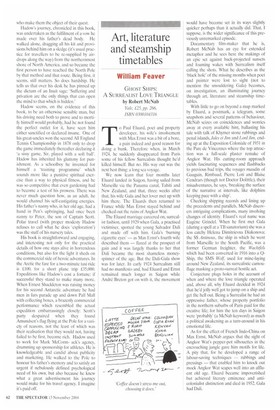Is your journey really necessary?
Lucy Hughes-Hallett
THE NORTH POLE: ALONE AND UNSUPPORTED by Pen Hadow Michael Joseph, £17.99, pp. 370, ISBN 0718147103 ."C) £15.99 (plus £2.25 p&p) 0870 800 4848 pen Hadow goes to the North Pole quite often. For a price he'll take you there too. When not undertaking one of his private expeditions he acts as a guide for his own travel company. For those with the time and cash and courage he can organise an arduous months-long trek. If you have to cram your polar adventure into your annual threeweek holiday, then you can join one of his 'Last Degree' trips: you'll be dropped by plane some 50 miles short of the Pole and make the last part of the journey over the ice on skis or, if you prefer, by snow-mobile. Hadow has escorted a client suffering from muscular dystrophy, he has posed at the Pole with a wheelchair-bound Ii-year-old. "The Arctic is still dangerous — the things that are likely to kill you there (thin ice, a polar bear) will do so far faster than a plane can arrive for a rescue — but the last places on earth are now tourist destinations and their comparative accessibility makes it harder than ever to imagine a rational response to the question of why anyone would risk their life to go to either Pole.
Already in the 1770s, when James Cook's expeditions to the Antarctic were celebrated with spectacular processions through the city of London featuring papier-mâché icebergs on floats and dancers in spangled Jack Frost outfits, there were commentators crabby enough to question the usefulness of exploring a region which offered no opportunities for trade, whose natural resources were so prohibitively hard to exploit and which could surely never make a hospitable habitat for human beings. But it is precisely its futility which makes polar travel so irresistible to those of a certain mindset. Polar travellers are pilgrims, not surveyors or merchant-adventurers, and the Poles are not rich prizes, like spice islands or diamond mines, but sites whose value, like that of the Grail, derives entirely from the emotions invested in them by those who make them the object of their quest. Hadow's journey, chronicled in this hook, was undertaken as the fulfilment of a vow he made over his father's dead body. He walked alone, dragging all his kit and provisions behind him on a sledge (it's usual practice for travellers to be re-supplied by airdrops along the way) from the northernmost shore of North America, and so became the first person to have reached the North Pole by that method and that route. Being first, it seems, still matters. So does hardship. He tells us that over his desk he has pinned up the dictum of an Inuit sage: 'Suffering and privation are the only things that can open the mind to that which is hidden.'
Hadow seems, on the evidence of this hook, to be an otherwise sensible man, hut his driving need both to prove and to mortify himself would probably, had he not found the perfect outlet for it, have seen him either sanctified or declared insane. One of his great-uncles won the second All England Tennis Championship in 1878 only to drop the game immediately thereafter declaring it 'a sissy game, Sir, played with a soft ball'. Hadow has inherited his gluttony for punishment. As a schoolboy he invented for himself a 'training programme' which sounds more like a punitive spiritual exercise than a way to physical fitness, and he was so competitive that even gardening had to become a test of his prowess. There was never much question how, as an adult, he would channel his self-castigating energies. His father's nanny who, in her old age, had a hand in Pen's upbringing, had once been nanny to Peter, the son of Captain Scott. Polar travel (with proper modesty Hadow refuses to call what he does 'exploration') was the stuff of his nursery tales. His book is straightforward and engaging, and interesting not only for the practical details of how one stays alive in horrendous conditions, but also for the light it sheds on the commercial side of heroic adventures. In the Arctic the fare for a two-minute taxi ride is £100, for a short plane trip /35,000. Expeditions like Hadow's cost a fortune: if successful they stand to make many more. When Ernest Shackleton was raising money for his second Antarctic adventure he had men in furs parade up and down Pall Mall with collecting boxes, a brazenly commercial performance which resembled the actual expedition embarrassingly closely: Scott's party despaired when they found Amundsen's flag flying at the Pole for a variety of reasons, not the least of which was their realisation that they would not, having failed to he first, become rich. Hadow used to work for Mark McCormack's agency, drumming up sponsorship for athletes. He is knowledgeable and candid about publicity and marketing. He walked to the Pole to honour his father's memory and to satisfy an urgent if nebulously defined psychological need of his own, but also because he knew what a great advertisement his journey would make for his travel agency. 1 imagine it's paid off.



























































































 Previous page
Previous page